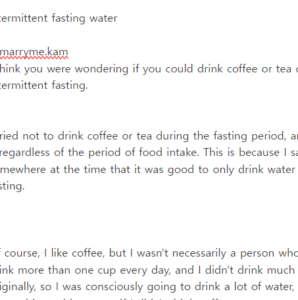In the 8th month of intermittent fasting, I wrote about six body changes. Many people read what was lacking in the aftermath of the SBS special broadcast. 간헐적 단식 커피
Intermittent Fasting: 6 Body Changes in 8 Months
I’ve become a little bit of a decent person | came out all day about intermittent fasting. It’s because of the SBS special that aired over the weekend. I’ve been fasting intermittently since June last year, but it’s been 8 months. I wrote about ‘intermittent body changes in the first month of fasting’ for brunch in July last year. Quite a few people read, shared, and gave their opinions. Among them, there was a comment from an SBS special writer. (I did intermittent fasting.)
brunch.co.kr/@kam/60
You came to see the article through various channels, and your eyes were on the words searched by the people who came through the search.
intermittent fasting coffee
an intermittent fast car
intermittent fasting water
@marryme.kam 
I think you were wondering if you could drink coffee or tea during intermittent fasting.
I tried not to drink coffee or tea during the fasting period, and I drank it regardless of the period of food intake. This is because I saw somewhere at the time that it was good to only drink water while fasting.
Of course, I like coffee, but I wasn’t necessarily a person who had to drink more than one cup every day, and I didn’t drink much water originally, so I was consciously going to drink a lot of water, so I didn’t have a big problem even if I didn’t drink coffee on an empty stomach.
@marryme.kam
When I looked again at the related data, the answer to ‘can I drink coffee or tea during intermittent fasting’ seems to be neither yes nor no. (I hate the expression ‘I think it’s ~’, but it’s hard to affirm because I’m not an expert.)
Before that, let’s briefly learn the principles of intermittent fasting. The basic purpose of intermittent fasting is to ‘reduce food intake’.
When food comes in, most of our body uses energy for basic metabolism, food digestion and decomposition, and muscle movement. When energy is scarce in the future, surplus energy is stored as fat.
If food intake decreases, the fat that has already been accumulated is taken out as an energy source. Intermittent fasting is a way to reduce food intake so that this process can occur.
You may worry that you break down your muscles first and use them as energy instead of fat. However, as long as your body fat is unusually large, you don’t need to worry about taking out fat first.
Applying this principle, “a diet that makes the body feel fasting without fasting” is the fasting imitation diet (FMD).
First of all, vegetables such as cucumbers and tomatoes, and nuts such as walnuts and almonds are sprinkled with relatively low-calorie olive oil and balsamic vinegar dressing to make up the diet to about 800-1100 kcal. This is the amount you eat per day.
It is said that the first day is to take 1,100 kcal and reduce it to 800 kcal from the next day for five days.
It is recommended to do it once or twice a month, and pregnant women, adolescents, or people with eating disorders or thyroid problems who need to eat nutrients should not do it.
Then can I drink coffee or tea during intermittent fasting?
1. In terms of calories, YES
Of course, drinks with high calories should not be drunk on an empty stomach. Coffee with milk, such as cafe latte and milk tea, and drinks with sugar, such as cola or juice, should not be drunk.
Instead, it is said that you can drink americano and tea with less than 5 kcal of calories during an empty stomach period.
@marryme.kam
You can drink all drinks regardless of calories while you can eat food, but drinking a lot of high-calorie, high-sugar drinks is not healthy, so it’s better to drink in moderation.
2. When it comes to gastrointestinal health, no
There are many studies showing that coffee is good for health, but the general theory is that it is not good to drink on an empty stomach.
Caffeine in coffee promotes gastric acid secretion. It can cause reflux esophagitis. The acidity of coffee fatty acids itself stimulates the stomach. Coffee causes rapid colon movement, which can also cause irritable bowel disease.
It is said that it is better not to drink coffee during the break so as not to burden your stomach.